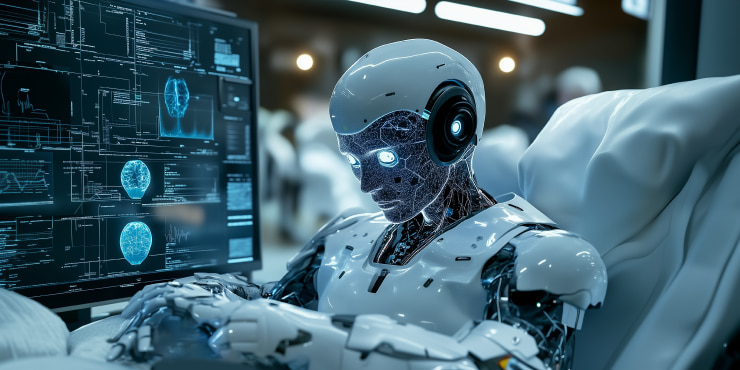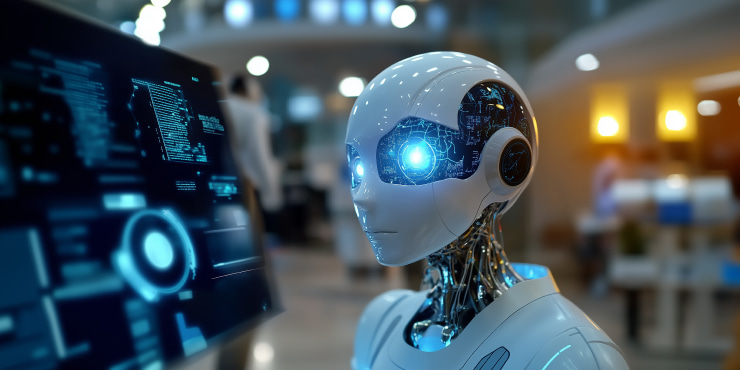Artificial Intelligence in Mental Health: Can AI Help Diagnose and Treat Mental Illness?

Health is fundamental to everyone's life. Mental health is essential for wellbeing and success and emotional health. Healthcare providers are committed to supporting patients. Today, AI is progressing and evolving in the healthcare industry. It plays a key role in mental health and has its advantages. A frequently asked question today is, "Can AI help with mental health?" Healthcare providers are working diligently to assess patients correctly.
Advanced technologies such as machine learning and algorithms affect the quality of healthcare. Through technological advances, it is possible to detect various diseases at early stages. AI helps determine a person's psychological state based on facial expressions. It also examines movements and behavioral data. As a result, doctors can learn about a person's psychological state and mental problems. The introduction of artificial intelligence creates an individualized design for each patient. AI and mental health are closely interconnected, and some issues need to be addressed.
AI's Role in Mental Health Diagnosis
Artificial intelligence is revolutionizing any field related to people. The healthcare sector deserves special attention, where every patient is a priority. Traditional psychological healthcare is effective. However, treatment can be a lengthy process, and the results may not always be correct.
Artificial intelligence analyzes a large amount of data using machine learning. Big data analytics and AI in mental healthcare are critical aspects. Artificial intelligence interprets human speech, facial expressions, and behavioral indicators. Here are the main advantages of artificial intelligence in human health diagnostics:
- Improved potential for early diagnosis. The issue is critical for the ability to prescribe an individualized treatment plan for the patient.
- Thanks to machine learning algorithms, identification in human speech is possible.
- Machine learning analyzes the patient's social networks and behavioral state.
- It becomes possible to find out the psychological state and consequences of depression.
- Artificial intelligence reduces bias and human errors for correct and accurate diagnoses.
- AI tools are helpful in assessing emergency psychiatric care.
- AI in behavioral health provides assessments remotely for people's benefit.
Diagnostic capabilities have improved. They help to clarify the patient conditions and accelerate treatment. Artificial intelligence in diagnostics is constantly evolving and has excellent potential. Here are the key examples of AI tools for diagnostics:
- Chatbots. Chatbots are an integral part of engaging potential patients. They use natural language processing to improve communication. Chatbots also detect the patient's emotional state.
- Algorithms. Algorithms can analyze language, patterned texts, and people's writing. Thanks to constant development and technology, depression is predicted based on social media. This transformation in healthcare helps patients to seek help.
How AI Analyzes Data to Detect Mental Health Issues
It is essential to understand "can AI treat mental illness?" based on data collection. Artificial intelligence is transforming diagnostics and utilizing large amounts of data. Analyzing this data helps to detect early signs of mental disorders. This enables doctors to understand a person's condition and prescribe treatment. AI analyzes speech, text, and physiological signals and detects depression and anxiety.
AI algorithms can process large data sets to identify patterns. By analyzing text and speech, artificial intelligence evaluates how people communicate. It can detect changes in tone, words, and sentence structure. Wearable devices identify these changes and signal psychological health issues. Advanced AI models can detect facial expressions and voice to identify emotional signals. These signals are associated with anxiety, stress, and depression. Here are 10 uses of artificial intelligence in mental health:
- AI-powered chatbots provide the emotional support that people need. They offer unique methods and strategies to overcome anxiety and stress.
- Algorithms analyze speech patterns and social media activity. Early signs of mental disorders such as depression and bipolar disorder are detected.
- AI tools can assess voice tone and process speech patterns and facial features. They help clinicians make accurate and correct diagnoses.
- Artificial intelligence in mental health is crucial for personalized health plans. It analyzes patient data to create individualized therapy and treatment plans.
- Systems can track behavioral data such as sleep and social interactions to prevent mental health crises.
- Virtual reality therapy is vital for the treatment of specific conditions. It usually treats post-traumatic stress disorder and anxiety in patients.
- AI-based programs provide guided meditation. This helps manage stress and track mental state.
- Extensive processing of mental health data is needed to improve treatment strategies.
- With the help of automated screening, an assessment is performed to understand the person's condition. The patient can receive professional intervention before the condition worsens.
- AI and mental health are interconnected for high-quality treatment approaches. Artificial intelligence helps doctors summarize patient stories.
Big data is essential in mental health diagnostics. AI identifies trends and risk factors that refine diagnostic models. AI analyzes social networks and identifies certain conditions. It can detect suicidal thoughts for early intervention and patient assistance.
Case Studies of AI-Assisted Diagnosis in Mental Health
AI has long been used in medicine and has demonstrated its effectiveness. It plays a key role in diagnosing mental disorders. Special programs and machine learning analyze human data. It becomes possible to identify a person's stress disorder and mental state in a short time. Here is information on real stories and applications of AI tools in diagnostics:
- AI for depression is crucial for its early detection. Certain studies from Harvard and the University of Vermont have shown their success story. They used artificial intelligence to analyze posts on Instagram and other social networks. Using this approach, they identified more than 70% of people with depression. The detection was based on facial expressions, frequency of posts, and color patterns.
- Researchers at Stanford University have developed a unique AI chatbot that uses natural language processing and engages users in specific conversations. Free provides cognitive behavioral therapy methods for people with high anxiety. As practice has shown, the percentage of people with anxiety symptoms decreased in just a few weeks.
- AI mental health therapy has become an integral part of many people's lives. Another good example is the US Department of Veterans Affairs. They tested AI-based analysis tools to detect post-traumatic stress disorder in veterans. Using voice dialing and speech patterns, biomarkers of people with this disorder are identified.
AI in Mental Health Treatment and Therapy

AI is revolutionizing therapy and making it more accessible and practical. Special tools such as virtual therapists and online platforms are helpful for counseling. They provide personalized help and support to individuals who require intervention and make significant progress. Here is a description of their use:
- Virtual therapists. AI mental health therapy often uses AI-powered chatbots to provide real-time support for users with special therapies. Virtual therapists offer ongoing support to help people cope with anxiety and depression. Conventional behavioral therapy and mindfulness techniques. People can quickly solve their problems without long waiting times and financial investments.
- Online counseling tools. Unique platforms integrate artificial intelligence and connect users to therapists. Tools and algorithms track the process and offer the necessary assistance. AI can analyze conversations and human moods and detect specific health patterns.
AI for mental health plays a key role in improving the human condition. AI can also provide individualized treatment for each person. The entire model of a person's speech, behavior, and physiological values is collected. Constant interaction with the user 24/7 helps to adapt these sessions. The patient receives specific recommendations that are useful to them. AI also monitors a person's progress and mental struggles.
Virtual Therapists and AI-Powered Support Systems
AI in mental health plays a key role in supporting patients and detecting warning signs at early stages. AI is revolutionizing mental healthcare using machine learning and natural language processing. These applications are uniquely AI-driven, and they mimic the human communication system. The right approach provides immediate emotional support and feedback to the person. The benefits of virtual therapists are indispensable and provide proven benefits. Here is their main characteristic:
- Constant availability. Mental health and AI work together to significantly impact the human condition. With round-the-clock availability, patients get an instant response. Chatbots can offer consultations and communication at any time. Patients can resolve their issues immediately and get valuable guidance.
- Financial accessibility. A significant advantage is being affordable and offering free help. Many therapeutic apps are affordable or free for a large category of the population. They make mental health support more accessible to those who cannot afford conventional therapy.
- Privacy and anonymity. AI for mental health is essential and offers confidentiality and anonymity. Users discuss their problems without fear of judgment or information leakage. The approach is beneficial for those who want to maintain their privacy.
- Personalized tips. AI-powered systems can analyze conversations and tailor responses specifically to the person's needs. They enhance the patient's experience and provide all the necessary help and support.
AI's Impact on Cognitive Behavioral Therapy (CBT) and Other Techniques
AI has excellent benefits for and improves cognitive behavioral therapy. It makes treatments personalized, scalable, and meta-accessible to clients. Virtual assistants enhance communication with people and support their mental state. AI in mental health is essential for optimizing CBT and other therapies. Studies show that AI-based CBT reduces symptoms of anxiety and nervous disorders. People get in an improved mood and get rid of depression thanks to CBT. This is how artificial intelligence is used to optimize treatments such as CBT:
- Individualized treatment plan. AI analyzes users' reactions and moods to customize special exercises. The therapy experience is adapted based on an individualized approach and progress.
- Round-the-clock guidance. Chatbots and virtual assistants provide 24/7 support based on CBT. Users recognize damaging thought patterns and practice positive thinking patterns.
- Data-driven tools. Mental health and AI are linked to user engagement, with emotional responses being integral. The tools track this engagement and allow for adjustments to the therapy techniques.
- Virtual reality therapy. Virtual reality is an effective tool for confronting your fears. It creates an immersive environment for treating post-traumatic stress disorder.
Ethical Considerations and Challenges of AI in Mental Health
AI is transforming and improving the mental healthcare system. In addition to its many benefits, AI comes with responsibilities. Responsibilities relate to data privacy, security and trust, and the role of human oversight. Here are the main issues to consider when researching artificial intelligence and mental health:
- Data privacy and security. AI tools generate a massive amount of data about people. Ensuring strong encryption and secure storage is essential. It is crucial against hacking and privacy issues.
- Accuracy and bias in diagnostics. Big data-driven sets can be biased. Incorrect diagnoses and interpretations of emotions are dangerous and lead to misdiagnosis. Addressing these issues and fully following up on assessments is essential.
- Trust and human involvement. AI in behavioral health plays a vital role. Chatbots sometimes provide negative support but lack human empathy. Correcting this situation and complementing therapists with artificial intelligence is an ethical issue.
- Ethical use of AI. Following clear ethical guidelines is a guarantee of the proper care for the patient. Transparency in decision-making plays a key role in the responsible use of care.
- Balance of AI and human experience. The right balance between the availability and effectiveness of AI and human experience is essential. Striking the right balance leads to user well-being and professional assistance.
Future Prospects of AI in Mental Health

Artificial intelligence in mental health plays a key role in improving it. The outlook for the future promises a valuable addition to traditional therapy. This creates an opportunity for doctors to close the gap in mental health research in patients. AI-based mental health tools are constantly increasing access to care. Remote areas where help is not available stand to benefit significantly. Specialized chat platforms and virtual therapists are transforming this area and helping patients.There is inexpensive round-the-clock support and accessible service. AI mental health diagnosis uses deep learning and predictive analytics. AI can interpret human language text and its physiological properties. The study of this issue helps to find out the emotional state and develop personalized interventions. The future promises integration with wearable devices that will track the human condition. They will investigate stress levels, sleep patterns, and heart rate. The study of privacy and security is important in the use of AI.


